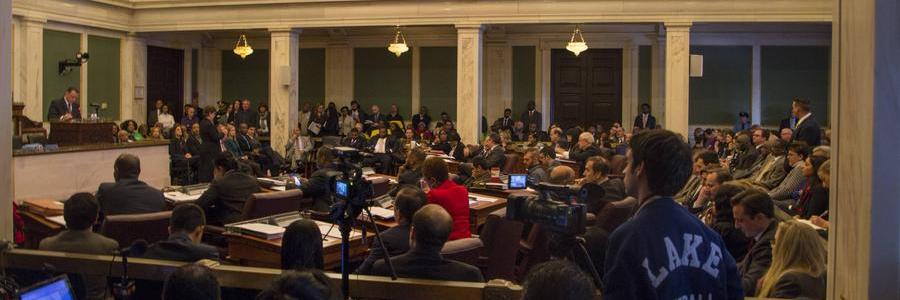Perhaps three months ago our IT services team received an invitation to participate in an RFP (Request for Proposal) from a large municipality in the Bay Area. They wanted to move from an ad-hoc and as-needed IT services model to one with real proactivity, project management, and future planning. Their current IT directors were smart, qualified engineers, but were so bogged down in the day to day management of everything that they couldn’t work on the long-term.
Fourteen IT companies from across the nation were invited to responded to the prestigious request, which was presented in a large packet detailing the city’s current and potential future IT infrastructure, plans, and staffing. The city had over 1200 specific devices to be managed and maintained, from small mobile tablets to large, high-availability storage clusters. The winning party would be responsible for answering around-the-clock helpdesk support, higher-level network engineering, and project design and implementation. The city’s budget for managed services—not inclusive of project labor, hardware purchases, or the like—was nearly $1 million per year, with the intention that this would be a 5+ year contract.
Though we are a large division of a national IT provider servicing the whole of the North Bay, and the other side of our local business provides office supplies and printer support to many of the region’s municipalities, school districts, and other public sectors, we as the local IT group have little direct experience with the very complex and unique networks that make up a city of their size, and certainly not together as a team.
As my company’s IT Business Development Manager((Though I’d much prefer to work in process improvement and analytics, I’m basically a glorified sales person)), I was tasked with forming our response to the city. After a full month of meetings and internal test drafts, conversations with our local, regional, and national teams, communications with the city and asking specific questions, I arrived at what I felt was a comprehensive response. With management’s approval, I submitted it to the city.
By and large our proposal talked about how we would be a partner to the city, and create service-level agreements (response time guarantees) with them as appropriate for each department, instead of painting the entire city with one unchanging service model. We (I?) discussed our engineers’ experiences with large and secure networks, how we strongly believe that clear communication and transparency is essential to a positive working relationship, and reiterating that ours would be a collaborative process, making sure we knew and served the specific needs of the city. All in all I think the proposal, along with a few follow-up appendices, weighed in around 15 pages.
Out of 14 initial hopeful service providers, 8 completed the bid process, submitting responses and hoping to advance to the next round. Of those, 4 were chosen for in-person presentations with key city personnel. Our office was quite pleased to learn that we were one of the few selected.
The city employee who was largely organizing the RFP and bid process assured us that while the meeting was called a “one-hour presentation,” it was expected to be much more of a round-table discussion, where the city could learn more about who we are and what we felt was important for the city to know about us. With those ground rules in place, I went to work making sure we had ready answers to the suggested questions they provided, as well as related topics we either did want to steer the conversation toward (e.g. our strengths), or tacitly avoid.
My boss proposed a short slide deck to explain not only my company’s long-standing local presence but also the relationship with the (inter)national parent corporation. My role was to explain the key differentiators which made us stand out from the competition, and to discuss the philosophy behind our service team.
Also wanting to make a large show of force of our local team presence, something we believed few of the other semi finalists could match, we brought a total of nine people to the presentation. Having prepped to make sure we knew how we were going to respond to questions—generally only one person answering any given question, handing off as necessary, with an emphasis not only on what we do but how our service would be a benefit—we drove to the city. We knew the city was also bringing nine members, including the heads of several important departments, the police chief, and senior management of their current internal IT department. It was a busy room.
Our local copier sales rep/account manager, who was largely responsible for us getting invited to the bid process in the first place, started off the presentation with some facts about our company and the many ways in which we partner with our North Bay community. My boss discussed the global corporation and its core business philosophies, and handed it over to me to discuss the hows and whys of our service, and why we would be a great fit for the city.
We very, very much wanted to avoid the “death by Power Point” scenario where we would spend an hour going over slide after slide, only to have lost the audience in the first few minutes. Under the assumption that we were going to have an open, round table-style discussion, the transition from our slides to their questions was critical. I gave them the floor by asking “now that you know a little about [company name], what is the city looking for in a partnership with an IT vendor?” We wanted to start the ball in their court, and hopefully glean more information that wasn’t in the sterile RFP with which we could tailor the rest of our responses to those needs.
My question was met with a flat and slightly annoyed “no.” The woman speaking, a senior department head, wanted to dive into our specific process for serving the city, in that we would be 100% directing them on what best practices to follow, rather than coming with a basket of ideas for us to work on collaboratively.
I realized I was the only person sitting at the head of the large city council table; my boss and the sales rep were off to my side, with our expansive team against the side wall. Nine sets of eyes from the city looked directly at me for an answer.
The good news is that I did not spend the remaining 50 minutes of our presentation monologuing to a group of half-interested officials. The bad news is that our presentation was slated for 90 minutes, not 60 like we had been told, and so instead I spent roughly 80 minutes being grilled by city staff.
They asked many questions that were not related to the suggested material we had been provided, and largely seemed displeased that our official presentation hadn’t gone into more detail about our specific work processes as related to supporting the city’s IT infrastructure. Some of the tough questions I had prepared for, but as a group we discussed who would be the best person to field each type of question. As has been famously remarked, “no plan survives first contact with the enemy,” and all of our plans went right out the window when they turned their eyes on me, and almost exclusively me, to field their questions and offer explanations.
Honestly it felt like I was in a ninety-minute boxing match with both hands weighed down by cement. The critiques of our proposal, of my in-person responses, and our admitted inability or unwillingness to say “this is our specific plan for the city”—again, by design presenting ourselves as a collaborative and flexible partner rather than an IT department czar—didn’t seem to end. I was lucky to redirect a few questions to our engineering, account management, or administrative staff, but largely it was me, alone, blasted with a fire hose.
When the ordeal was finished, I didn’t have a good feeling about our performance. Almost half of the city panel seemed to be tuned out for most of my talks, and several seemed simply dismissive of us as a contender in this process. It was rough, and honestly((One comment I received from a teammate later was that I say “honestly” and “realistically” a lot, likely as a slight buffer when I’m uncomfortable about giving a particular answer. I couldn’t disagree.)) all I wanted to do was throw up.
Instead we as a nine-person team went to a late lunch to discuss how the whole process went. Nobody walked into the restaurant in a jovial mood. Though much was said, one comment particularly sticks out: “we’re so glad you were able to handle all that, and we’re so sorry you had to handle all that.” Whoever was or wasn’t prepared for their part, whoever had or hadn’t been along for all of the prep work that went into the RFP process to get us to that point, none of that mattered. What it felt like was that I alone was responsible for us doing so (presumedly) poorly.
I did reserve some faint praise, but as anyone who peruses my Self-Reflection posts know I’m not great at receiving or accepting acknowledgement. Honestly, the praise actually made me feel worse. An anecdote:
When my elementary class made it to 4th grade and moved over to the “big kids’” side of the school campus, one of the big changes was that we had to run a mile as part of our PE curriculum. We didn’t have a fancy track, just a large baseball and soccer field that seemed impossibly expansive to our young minds. Our first mile run came, and the timers began.
One of my friends at the time was not athletic, not very coordinated, and suffered from asthma. He brought up the rear of the class by several whole minutes, his gait more of a shuffling hobble than any semblance of a jog, wracked by wheezing. The teacher suggested we clap and cheer him on, that we welcome him to the finish line as he turned the corner to the home stretch. We did, hooting and yelling our support as he eventually crossed the mile mark.
Instead of our cheers being an aid however, they sent him into great, gasping wails. “Stop making fun of me!” he screamed at us, hiding his teary eyes and walking away to cry in private. I don’t think any of the kids understood—I sure didn’t at the time—why was he upset when all we were doing was trying to help?
Now, three decades later, I look back on that moment and I recognize that he didn’t want attention drawn to his perceived failings, to be called out in any way for being different, particularly when being “different” meant being the slowest of the class. I hope in the intervening time he has forgotten that particular experience, but I remember because I see its like happening over and over again in my own life.
All of the complements that were laid upon me by my coworkers felt hollow and false. It felt like they had just watched me come up dead last in a simple test of skill and their attention made the failing even more apparent and even more painful. I wasn’t in a very good emotional place after that meal.
This morning we had our weekly three-hour wrap-up/review meeting, where we discuss changing trends in the industry, projects we have either in the works or recently completed, and share information about our diverse client base, as a way to ensure everyone’s on the same page when it comes to their comings and goings. Walking into that room I saw the president of our company sitting at the foot of the table, and I knew—whereas before I just suspected with dread—that much of the meeting would be focused on reviewing the previous day.
To his credit the president took all of the blame for our apparent unpreparedness on himself, assuring the team and me that he should have pushed harder and been more involved in the process, and that I did the best I could with the information I had. That still didn’t make me feel very good, and I spent a good two hours of that meeting sitting silent, only speaking when addressed, and then in clipped, terse sentences. “How are you feeling?” I was asked in front of everyone. “Like garbage,” was my honest and unfiltered reply. “Couldn’t sleep Wednesday night from stress of the upcoming presentation, couldn’t sleep last night from stress of how it all went.”
“I’m surprised you’re taking this so hard,” my boss said offhandedly, to which I didn’t respond. I felt a great deal of ownership over this project, and was the individual most directly responsible for its design and execution. The city had read my words and then listened to me talk for over an hour, and the general impression was that they were left unsatisfied. The rhetorical question in my mind was “how could I not take it hard?” I stayed silent.
The internal review wrapped up after about an hour and a half, just as long as we had presented to the city the day before, and my mood was not any improved by the rest of the meeting. Tempers flared, sniping comments were made, and though more compliments were laid on my feet, they rang even more false than they had the day before.
My boss asked if I would be around in the office after lunch. I just gave him a dead-eyed look and said “no.”
True to my word, after a coworker thoughtfully took me out to lunch, I went home, trying to recoup some of the sleep that I had failed to find over the prior two nights.
My boss thinks we still have a shot and hopes that we’ll get a positive response from our presentation toward the end of next week. From a point of openness, I must say don’t have any such hope. Though I’ve received assurances up and down the team that this was a communal effort and a learning experience, it still feels very much like a personal endeavor, one for which I was the designer, the planner, the face, and ultimately, the reason we didn’t succeed.
It’s not a great feeling.
Header image of the Philadelphia City Council taken by Jared Piper, used with attribution













